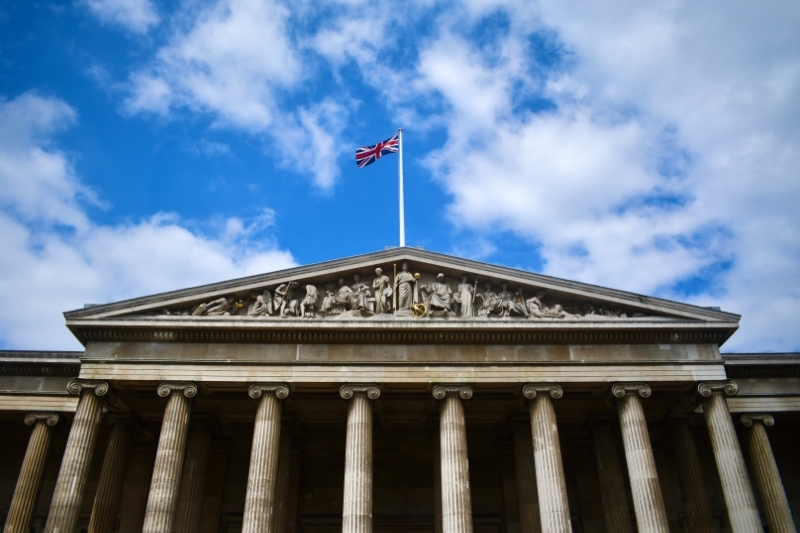The British Museum, located in London, is renowned for its vast collection of cultural artifacts from around the world. However, it has been embroiled in a long-standing controversy regarding its refusal to return stolen artifacts to their countries of origin. This article aims to delve into the heated debate surrounding the museum’s stance on restitution and explore the ethical implications involved.
The Parthenon Marbles and the Sixth “sister” Caryatid
One of the most prominent cases of stolen artifacts in the British Museum’s possession is the Parthenon Marbles, also known as the Elgin Marbles. These ancient Greek sculptures were originally part of the Parthenon temple on the Acropolis in Athens. However, Lord Elgin, a British diplomat, controversially removed them during the early 19th century and later sold them to the British Museum.
Another significant artifact is the Sixth “sister” Caryatid, which was part of a group of female statues supporting the Erechtheion temple on the Acropolis. Like the Parthenon Marbles, this sculpture was also taken by Lord Elgin and eventually found its way to the British Museum. These stolen artifacts hold immense cultural and historical value for Greece, leading to a strong desire for their return.
The Greek government’s appeal for the return of the Parthenon Marbles: A cultural nationalist agenda?
For over 40 years, the Greek government has been tirelessly advocating for the return of the Parthenon Marbles. Critics argue that the appeal for their return is entirely based on emotion and sentiment rooted in a cultural nationalist agenda. They claim that Greece is using the stolen artifacts as a symbol of national pride and attempting to rewrite history by reclaiming them.
However, supporters of the Greek government’s plea argue that the cultural significance of these artifacts cannot be denied. The Parthenon Marbles are viewed by many as an integral part of Greece’s heritage, and their rightful place is in Athens, where they can be fully appreciated within their original context. The debate surrounding the return of stolen artifacts is not just about nationalism but also about preserving cultural identity and respecting the history of a nation.
The ethical dilemma: Is the British Museum prioritizing profit over morality?
The refusal of the British Museum to return stolen artifacts raises ethical concerns. Critics argue that the museum’s decision is driven by financial considerations, as these artifacts attract millions of visitors each year, generating substantial revenue. By keeping the stolen pieces, the British Museum is accused of prioritizing profit over morality.
However, the British Museum contends that it provides a global platform for these artifacts, allowing people from all walks of life to admire and learn from them. Moreover, they argue that by preserving and displaying these stolen artifacts, they are fulfilling their duty to preserve world heritage. The museum maintains that it is not their role to arbitrate on the ownership of cultural property and that their collections should remain accessible to all.
The debate on restitution: Should the British Museum give back the stolen artifacts?
The debate surrounding the restitution of stolen artifacts is multifaceted. On one hand, proponents argue that the British Museum has a moral obligation to return these cultural treasures to their rightful owners. They believe that the theft and acquisition of these artifacts during colonial times were unjust, and it is the responsibility of institutions like the British Museum to rectify these historical wrongs.
On the other hand, opponents argue that the British Museum is acting as a custodian of world heritage and that removing these artifacts from its collection would be detrimental to the preservation and accessibility of these treasures. They argue that the museum plays a crucial role in educating and enlightening the public about the history and cultures of different nations.
The legal perspective: International laws and agreements on cultural heritage restitution
The issue of cultural heritage restitution is not only a moral and ethical one but also a legal one. International laws and agreements have been established to address the repatriation of stolen artifacts. For instance, the UNESCO Convention on the Means of Prohibiting and Preventing the Illicit Import, Export, and Transfer of Ownership of Cultural Property encourages the return of cultural property to its country of origin.
However, the legal framework surrounding restitution is complex and often subject to interpretation. It is crucial to consider the specific circumstances of each case and the legal agreements in place at the time of acquisition. The British Museum argues that the acquisition of the Parthenon Marbles by Lord Elgin was lawful at the time. Resolving these legal complexities is vital to finding a fair and just solution to the restitution debate.
Public opinion and activism: The growing pressure for the return of stolen artifacts
In recent years, there has been a significant shift in public opinion regarding the return of stolen artifacts. Activist groups and cultural organizations have been actively campaigning for the repatriation of these treasures. They argue that keeping stolen artifacts in Western museums perpetuates a colonial mindset and reinforces power imbalances between nations.
Social media and digital platforms have played a crucial role in mobilizing public support for the return of stolen artifacts. Hashtags such as #ReturnTheMarbles and #DecolonizeMuseums have gained traction, raising awareness and putting pressure on institutions like the British Museum to address the issue. The growing public sentiment has forced museums to reconsider their acquisition policies and engage in dialogue with countries seeking the return of their cultural heritage.
Alternative solutions: Collaborative approaches and digital repatriation
As the debate on the restitution of stolen artifacts intensifies, alternative solutions have emerged. One approach is collaborative partnerships between museums and countries of origin. These partnerships involve sharing resources, knowledge, and expertise to ensure the proper preservation and display of cultural artifacts. This approach promotes mutual understanding and fosters cultural exchange while respecting the principles of ownership and heritage.
Digital repatriation is another innovative solution gaining traction in the museum industry. This involves creating digital replicas or virtual exhibits of stolen artifacts, allowing people from around the world to access and appreciate them. While digital repatriation cannot fully replace the tangible experience of viewing these artifacts, it provides an opportunity for broader accessibility while ensuring the preservation of the originals.
The impact of the debate: How the controversy is shaping the museum industry
The debate surrounding the British Museum’s refusal to return stolen artifacts is not confined to one institution. It has sparked a broader discussion about the ethics and responsibilities of museums globally. Museums are increasingly reevaluating their acquisition policies and reconsidering the provenance of their collections. The controversy has prompted calls for greater transparency, accountability, and collaboration within the museum industry.
The ongoing debate has also highlighted the need for a balanced approach that respects cultural preservation while acknowledging the historical injustices associated with stolen artifacts. Museums are grappling with the complexities of restitution, striving to find a middle ground that respects the rights of nations to reclaim their heritage while ensuring the preservation and accessibility of these cultural treasures.
Conclusion: Finding a balance between cultural preservation and ethical responsibility
The British Museum’s refusal to return stolen artifacts, such as the Parthenon Marbles, has ignited a passionate and ongoing debate. The controversy surrounding this issue raises important questions about the role of museums in the preservation and restitution of cultural heritage. While the British Museum argues that it provides global accessibility to these treasures, critics argue that the museum’s stance prioritizes profit over morality.
Finding a balance between cultural preservation and ethical responsibility is crucial. Collaborative partnerships and digital repatriation offer alternative solutions that promote cultural exchange and accessibility while respecting the principles of ownership and heritage. As the debate continues to shape the museum industry, it is imperative for institutions to navigate the complexities surrounding stolen artifacts and work towards a fair and just resolution.





